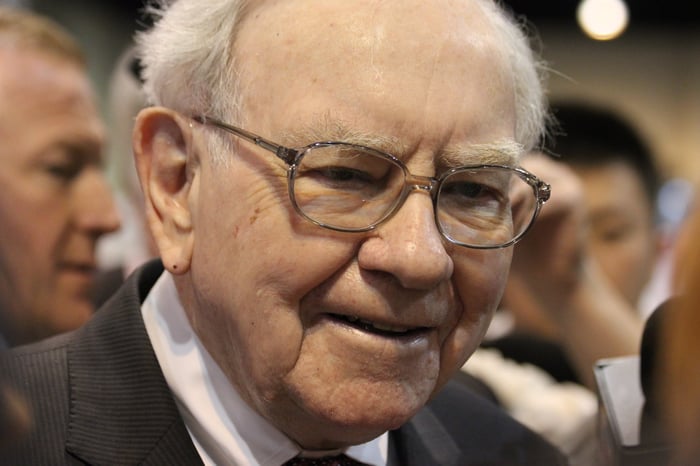For nearly six decades, Berkshire Hathaway (BRK.A 1.18%) (BRK.B 1.30%) CEO Warren Buffett has been nothing short of a money machine for his shareholders. The Oracle of Omaha, as he's come to be known, has practically doubled up the average annual total return of the S&P 500 since 1964. In aggregate, Buffett has led his company's Class A shares (BRK.A) to a return of 3,781,451%, as of the closing bell on Feb. 8, 2023.
Warren Buffett's formula for success is pretty straightforward. He typically buys brand-name, profitable businesses that consumers trust, and he allows his investment thesis to play out over many years, if not decades. By focusing on cyclical companies in the financial and consumer staples sectors, he's been able to deliver steady returns for Berkshire Hathaway's shareholders.
But what if I told you that a small portion of Berkshire Hathaway's invested assets were tied up in the hottest growth trend at the moment? Yes, I'm talking about artificial intelligence (AI).

Berkshire Hathaway CEO Warren Buffett. Image source: The Motley Fool.
Yes! Warren Buffett (indirectly) owns AI stocks
In its simplest form, AI uses machines and systems to handle tasks humans would normally take care of. These machines and systems are capable of adapting and growing smarter over time, just like humans, which is what gives AI such promise and broad application.
Although estimates vary wildly given the relatively nascent nature of this technology, AI could be one of the fastest-growing trends of the decade. According to a report from Grand View Research, the global AI market is expected to grow by a compound annual rate of 37.3% between 2023 and 2030, and ultimately reach $1.81 trillion.
If you're thinking AI technology is all a bit too complicated for Warren Buffett, you're absolutely correct. Berkshire Hathaway's investments in AI stocks aren't found in the portfolio the Oracle of Omaha oversees. Rather, it's in what I like to refer to as "Warren Buffett's secret portfolio."
Back in 1998, Berkshire Hathaway acquired reinsurance company General Re for $22 billion. General Re also owned a specialty investment firm, known as New England Asset Management (NEAM). When Buffett's company bought General Re, it became the owner of NEAM as well. Today, NEAM has nearly $5.9 billion in assets under management. Even though Warren Buffett doesn't oversee NEAM's buying and selling activity, what NEAM owns is, ultimately, owned by Berkshire Hathaway.
Within this secret portfolio are three stocks where AI is very much part of the future.
Microsoft
The most prominent AI stock held by Warren Buffett's hidden portfolio is Microsoft (MSFT -1.27%). New England Asset Management was holding 55,743 shares of the company behind the most-popular operating system on the planet (Windows), as of Sept. 30, 2022.
Although a lot of focus has rightly been cast on Microsoft's rapidly growing cloud infrastructure service Azure, the buzz of late has to do with CEO Satya Nadella and his team introducing freshly updated versions of its Bing search engine and Edge web browser, now powered by AI.
Utilizing AI with Bing is a potential game-changer for Microsoft. Instead of users clicking on multiple pages to have their questions answered, AI can provide more thorough search queries without having to click on numerous links. AI-driven popups and sidebars can also provide answers to comprehensive questions, as well as allow for immediate actions taken by users. The latter is what could allow Bing to potentially chip away at Google's veritable monopoly in global internet search. Google is a subsidiary of Alphabet.
The AI software powering Bing comes from OpenAI, which is the company behind the popular AI-driven chatbot, ChatGPT. After investing $1 billion in OpenAI in 2019, Microsoft announced a multiyear, multibillion-dollar follow-up investment in OpenAI just last month.
While it's not uncommon for the buzz surrounding a next-big-thing investment to outpace tangible results, Microsoft has made it very clear AI is engrained in its future.
IBM
A second AI stock that's been a fixture in Warren Buffett's secret portfolio for the past eight years is tech stock IBM (IBM 0.06%). New England Asset Management closed out the third quarter with 36,805 shares of IBM in its investment portfolio.
When most people think of IBM, they're liable to envision a slow-growing, moneymaking blue-chip with a top-notch dividend. IBM was a bit slow to transition to a cloud-driven future, and has used acquisitions as a way to close the gap for its tardiness. Though it's remained quite profitable, its legacy operations were a drag for years.
However, IBM's ongoing transformation relies on two high-growth opportunities. First, it's attempting to establish itself as a clear leader in hybrid-cloud solutions. With more people than ever choosing to work remotely, there's a growing need for public and private cloud security, as well as a way for public and private clouds to interact with each other. IBM is making that happen and taking advantage of a well-defined shift in the labor market.
The other key growth driver for IBM is AI. Although supercomputer Watson is perhaps the best example of IBM's AI and analytics in action, it's far from the most practical. Instead, IBM offers an abundance of services incorporating AI and machine-learning technology. This includes relying on AI to converse with customers online; allowing AI to make large data more easily understandable to streamline operations, and even using AI to help businesses maintain regulatory governance standards in a world with ever-changing laws.

Image source: Getty Images.
Nvidia
The third artificial intelligence stock held in Warren Buffett's secret portfolio is semiconductor specialist Nvidia (NVDA -10.01%). New England Asset Management's stake totaled 3,050 shares at the end of the third quarter.
Nvidia is best-known for its role as a graphics processing unit (GPU) giant. The company's GPUs are used by gaming enthusiasts, businesses operating large data centers, and even cryptocurrency miners. Nvidia accounts for nearly a fifth of global GPU sales, and holds the lion's share (80%) of the discrete graphics card market.
The most direct impact Nvidia is having within AI has to do with its GPUs. Since AI is reliant on high-powered computing, the company's GPUs are a necessary tool that facilitates machine-learning and split-second decision-making.
But Nvidia's AI opportunity involves more than just taking advantage of businesses need for high-powered GPUs. Last year, the company introduced a number of AI platform initiatives, including its conversational AI platform and AI Enterprise platform. These solutions provide tools that let businesses deploy virtual agents or chatbots, as well as oversee the development and deployment of AI innovations.
While AI is unlikely to be a significant revenue driver for Nvidia anytime soon, the company's actions make clear that AI is a big part of its future.





